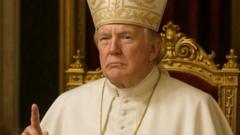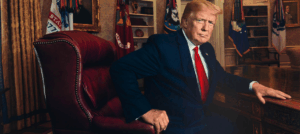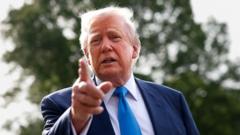**As Europe commemorates VE Day, the shadow of Donald Trump's presidency looms large, igniting debates on transatlantic ties and security.**
**VE Day Reflections: A Mixed Sentiment in Europe Amidst Trump’s Footprint**

**VE Day Reflections: A Mixed Sentiment in Europe Amidst Trump’s Footprint**
**Marking 80 Years of VE Day, Europeans Voice Concerns Over Current Political Dynamics**
In the wake of the 80th anniversary of Victory in Europe (VE) Day, sentiments across Europe reflect a complex mixture of celebration and apprehension, largely influenced by contemporary political tensions, particularly regarding the United States' foreign policy. As nations remember the sacrifices made to defeat Nazism, former NATO officials describe this year's commemorations not as celebrations, but rather as somber acknowledgments of a troubling political landscape.
The ongoing debate centers around how Donald Trump's presidency is perceived in Europe, with many seeing him as a threat to the longstanding alliances formed after World War II. For the continent, Trump is often viewed as undermining shared democratic values and security principles that had united Europe and the U.S. for decades.
Historically, VE Day represents a joint triumph among Allies against Nazi Germany, costing millions of lives from nations including the USSR, which prior to the war had its own contentious relationship with the West. The lingering impacts of the war revealed deeper fractures within Europe, particularly between Eastern and Western nations. As a result, the mood on VE Day differs significantly from nation to nation, with Western Europe largely celebrating liberty while central and Eastern Europe grapple with the memory of subsequent Soviet dominance.
In Russia, oppression continues as President Vladimir Putin uses military parades to reinforce national pride in the victory over Nazism, a narrative that echoes in his contemporary rhetoric toward Ukraine, causing disquiet and historical trauma for many in Eastern Europe. Amidst strained relations, the reality of a Russian war against Ukraine resonates deeply with countries that suffered under past occupations, evoking fears of a similar fate.
Trump’s policies and remarks have raised alarms within Europe, where fears of U.S. disengagement have grown. His perceived alignment with Putin has prompted a reevaluation of how European nations view their defense and security, prompting some leaders to advocate for greater self-reliance. Germany, for example, is beginning to reconsider its long-standing commitment to NATO and U.S. military support in the wake of shifting geopolitical dynamics.
Despite the challenges, there is recognition among European leaders of the need to bolster their own security capabilities, a change that could reshape the transatlantic relationship. Optimists see this period as a potential turning point, prompting a much-needed reassessment of defense priorities even as they confront the complicated task of gaining public support for increased military expenditure.
As VE Day commemorations take place, they serve not only as a remembrance of historical sacrifices but as a prompt for European nations to reassess their collective security philosophies in a new world order, grappling with the lessons of cooperation and the consequences of division that emerged from past conflicts. The hope remains that future leaders can navigate these tumultuous waters without repeating past mistakes.
The ongoing debate centers around how Donald Trump's presidency is perceived in Europe, with many seeing him as a threat to the longstanding alliances formed after World War II. For the continent, Trump is often viewed as undermining shared democratic values and security principles that had united Europe and the U.S. for decades.
Historically, VE Day represents a joint triumph among Allies against Nazi Germany, costing millions of lives from nations including the USSR, which prior to the war had its own contentious relationship with the West. The lingering impacts of the war revealed deeper fractures within Europe, particularly between Eastern and Western nations. As a result, the mood on VE Day differs significantly from nation to nation, with Western Europe largely celebrating liberty while central and Eastern Europe grapple with the memory of subsequent Soviet dominance.
In Russia, oppression continues as President Vladimir Putin uses military parades to reinforce national pride in the victory over Nazism, a narrative that echoes in his contemporary rhetoric toward Ukraine, causing disquiet and historical trauma for many in Eastern Europe. Amidst strained relations, the reality of a Russian war against Ukraine resonates deeply with countries that suffered under past occupations, evoking fears of a similar fate.
Trump’s policies and remarks have raised alarms within Europe, where fears of U.S. disengagement have grown. His perceived alignment with Putin has prompted a reevaluation of how European nations view their defense and security, prompting some leaders to advocate for greater self-reliance. Germany, for example, is beginning to reconsider its long-standing commitment to NATO and U.S. military support in the wake of shifting geopolitical dynamics.
Despite the challenges, there is recognition among European leaders of the need to bolster their own security capabilities, a change that could reshape the transatlantic relationship. Optimists see this period as a potential turning point, prompting a much-needed reassessment of defense priorities even as they confront the complicated task of gaining public support for increased military expenditure.
As VE Day commemorations take place, they serve not only as a remembrance of historical sacrifices but as a prompt for European nations to reassess their collective security philosophies in a new world order, grappling with the lessons of cooperation and the consequences of division that emerged from past conflicts. The hope remains that future leaders can navigate these tumultuous waters without repeating past mistakes.


















